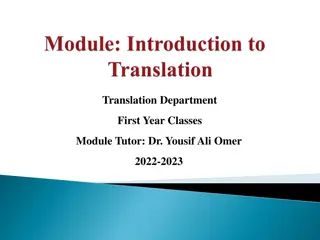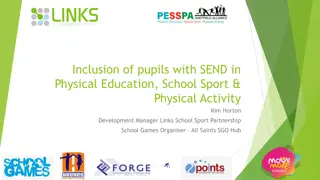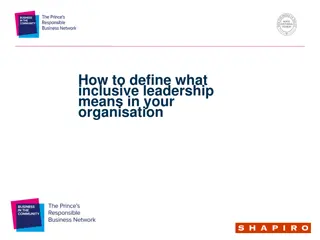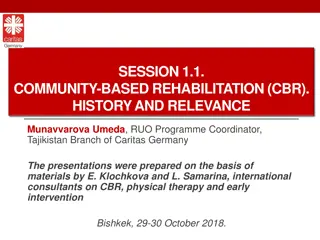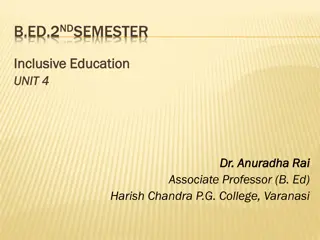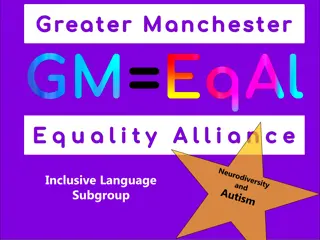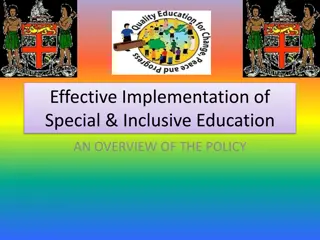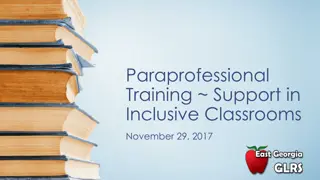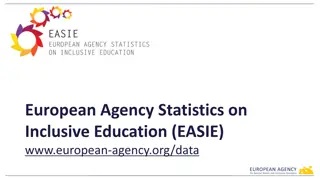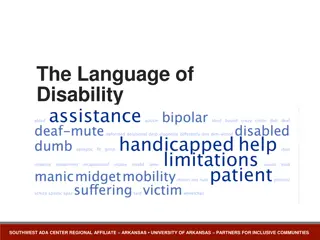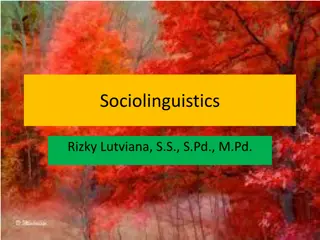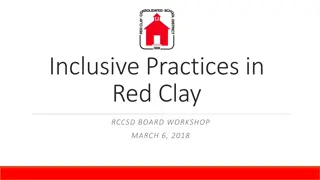Enhancing Language Access for Inclusive Services
Explore the importance of language access in providing quality services for individuals who communicate differently. Learn best practices, responsibilities, and tools to offer advocacy through interpretation and translation services. Understand discriminatory practices to ensure equitable services for all populations.
Download Presentation

Please find below an Image/Link to download the presentation.
The content on the website is provided AS IS for your information and personal use only. It may not be sold, licensed, or shared on other websites without obtaining consent from the author.If you encounter any issues during the download, it is possible that the publisher has removed the file from their server.
You are allowed to download the files provided on this website for personal or commercial use, subject to the condition that they are used lawfully. All files are the property of their respective owners.
The content on the website is provided AS IS for your information and personal use only. It may not be sold, licensed, or shared on other websites without obtaining consent from the author.
E N D
Presentation Transcript
COMMUNICATION AND LANGUAGE ACCESS Providing quality services for people who communicate differently from you Meg Savage (she/her), CLO Olivia Spradlin (she/her) Sr Program Specialist
Introducing ZeroV Mission To abolish the social conditions and systems that spark, enable, and amplify Intimate Partner Violence, and to create communities where all Kentuckians can live and thrive in safety and peace. Vision All individuals, families, and communities have what they need to live in safety and thrive. We are still the statewide coalition for our 15 designated member programs and fulfill the role of advocating at the state level for survivors and victims of intimate partner violence.
Learning objectives Attendees will understand the importance of language access. Attendees will learn best practices for providing advocacy by utilizing interpretation and/or translation services. Attendees will become familiar with resources and tools to assist in providing advocacy with people needing language services.
Individual/program responsibilities To provide non-discriminatory services, specifically to not discriminate on the basis of English proficiency To provide language access, as defined in the federal register, includes providing notice, available and accessible documents, investment in policies and procedures, periodic training and monitoring, and training. Familiarize yourself with your agency s Limited English Proficiency Plan and Language Access Policies and Procedures
Federal Register Vol. 67, NO. 117 Tuesday June 18, 2002/Notices, p 41455-41472 Comports with Meaningful Access All staff serve all persons, all persons receive equitable services
What are discriminatory services? Limiting participation in a program or activity on the basis of an aspect of identity Subjecting people from underserved communities to unreasonable delay in services Failing to inform members of underserved populations about their right to access services and reasonable accommodations and to do so free of charge Providing services that are more limited or lower in scope than those provided to other persons
Notice Letting LEP persons know that services and accommodations are available, free of charge Providing notice in languages other than English Examples: Posting signs in intake areas, entry points, and common areas Stating availability of information, accommodations, and services in documents Working with and sharing information with community-based organizations and stakeholders PSAs and Media Public Awareness and Community Engagement and Education
Policy and Procedure Each agency s needs vary, and every agency should have a tailored Limited English Proficiency plan. All volunteers and staff should be reasonably prepared to serve all people requesting services and communicate with them (and their families or other stakeholders as appropriate) effectively and efficiently, in order to perform best interest advocacy. Reach out to your agency for specific guidance, policies, and procedures. Read them; know them.
Interpretation vs translation Translating refers to written text, documents, forms Interpretation refers to spoken interactions
Available and Accessible Documents What materials do you need translated so that LEP persons can fully participate in your services? What materials do you have available? Who can you get to translate?
Language identification sheet Sample: CASA of Lexington Laminated language sheet to identify language needs Useful for home visits
Interpreters You may interact with a variety of interpreters: Court-provided interpreters DCBS-provided interpreters Interpreters provided by the CASA program Telephone interpreters, virtual meetings You would most likely need an interpreter during a home visit or phone call. Consult with your program on how to access an interpreter when needed.
Best practices when working with interpreters Introduce the interpreter Speak directly to your client, not to the interpreter Physically position yourself aligned with client Do not switch to third person pronouns (she/he/they); use second person pronouns (you) when referencing your client Modulate speed rather than volume Speak at an even pace and in short segments Be patient, possibly allow for extra time Do not use idioms; speak directly
Best practices when working with interpreters Encourage interpreter to ask you questions if they need clarification Repeat back important information to make sure everyone understands Remember the interpreter s job is to interpret accurately anything that is said in the meeting. If there are things you don t want the interpreter to relay, then don t say them. Similarly, if any party is divulging information that may be harmful, you may want to remind them of this, re-steer the conversation, or suggest that another meeting be scheduled with appropriate parties.
Who cannot be an interpreter? Children Family member of the child Family member of the alleged abuser Friend of the family Interpreter used by the alleged abuser
Who should be an interpreter? 1. Someone who has a commitment to interpreter ethics 2. Received training in interpreter skills 3. Proficient in both languages. 4. Non-judgmental 5. Adult
Qualified interpreters Certified Interpreters aren t always available How are you and your programs determining if an interpreter is qualified? Qualified and community interpreters are subject to codes of ethics Check with your program or agency as to these codes
Language Line Service that provides interpretation for phone calls, virtual meetings, and limited in-person communication Use for Video Remote Interpreting (VRI) for ASL Can be accessed through phone, apps, internet, tablets, and for video with devices with cameras Can be scheduled ahead of time or accessed as needed
Use of bilingual advocates/service providers -May still need to offer an interpreter be aware of what role you are filling if you are interpreting for your client -Familiarize yourself with your agency s expectations for interpretation and for interpretation ethics -Pay attention to the person speaking and then address the person you are speaking to -In this dual role, you may need to attribute who is saying what to avoid confusion -Ask both parties to speak at a moderate speed and to offer pauses so that you can interpret smaller sections rather than having to remember multiple sentences or paragraphs. -If you are serving as the interpreter, may need to have a pre session with the parties separately and before your meeting to set expectations and roles -Not a reason for your agency to not provide interpreters - the goal is that all staff serve all persons and that all persons receive equitable services.
Ethics for interpreters Maintain Confidentiality Never Give Medical or Legal Advice Remain Impartial Interpret faithfully and accurately to convey the content and spirit of what is being said; do not paraphrase; should interpret everything said If you make a mistake, acknowledge it and go back and fix it. If you do not know a word, inform the client May not accept tips or gratuity from clients
Special populations Deaf or Hard of Hearing Access Kentucky Relay Service, through Kentucky Commission on Deaf and Hard of Hearing TTY machines Video Remote Interpreting for ASL School for The Deaf in Danville, Kentucky
Special populations Complex communications needs CCN Limited use and/or understanding of speech Developmental disability Genetic condition Acquired conditions such as dysarthria, stroke, acquired brain injury Progressive disorders like motor neurone disease Cognitive communication disorders like aphasia AAC Augmentative and alternative communication - Provides language input and output Includes all the ways someone can communicate without using spoken language gestures, facial expressions, limited speech, sign language, pictures, high or low technology, or a combination
Complex Communication Needs way to communicate with you? Just as with other types of interpreters, communicate with the person, not the interpreter (if there is one) Remember CCN does not equate to an intellectual disability; receptive language may be greater than expressive language Speak in a normal tone and at a normal pace using short sentences. Communicate one idea at a time. Give specific choices rather than open-ended questions. Do not pretend to understand when you don t. If you don t understand, let the person know and ask them to repeat or say it differently Communication partner someone familiar with the person and how they communicate Caution that person may be the person doing harm! Use their systems and strategies, provide ample time for communication ask What is the best
Language accessibility and the courts KRS 30A.410 when an interpreter shall be provided In any matter, criminal or civil, the court shall appoint a qualified interpreter, paid by the state, for a party, juror, or witness who is Deaf or Hard of Hearing; Cannot communicate in English; or Has a disability which prevents them from understanding the proceeding and substantially prejudices their rights
Supreme Court of KY, Rules of Administrative Procedure, Part IX Court proceeding in court-proceeding or a court-ordered proceeding in which court officials or Court of Justice personnel are directly involved Direct service out of court services provided by Court of Justice entity which enables it to carry out its duties and responsibilities The Court will appoint a qualified interpreter for non-parties as well as parties, jurors, witnesses, and Deaf or Hard of Hearing attorneys during court proceedings or for direct services A non-party is a person whose presence and participation are necessary and appropriate, such as a parent, guardian, or family member of a juvenile, or a family member, friend, or associate of the party who is an appropriate individual with whom the Court should communicate The person needing an interpreter, or their advocate or attorney, should make the request for an interpreter in writing to the clerk as far in advance of the hearing as possible
Auxiliary aids and services The Court should assess each situation on an individualized, case-by-case basis to determine if the court needs to provide auxiliary aids and services to ensure effective communication with people who are Deaf/Hard of Hearing or have a disability Assistive Listening Devices a mic, transmission system, and receptive device CART Communication Access Realtime Translation word for word realtime speech to text display Qualified sign language interpreters using the same sign system as the individual who is deaf The Court should give primary consideration to the aid or service preferred by the person who needs it because they are best able to identify the communication barriers that hamper participation
When does the Court not have to provide/pay for an interpreter? KJOC does not have to pay for or provide interpretation services for non-Court proceedings or direct services, even if the individual is court ordered to obtain services from a non-Court of Justice entity (for example, parenting classes or substance abuse counseling or batterers intervention classes) BUT any entity that receives any federal funding must provide ADA accessible AND nondiscriminatory services, which includes language access for people who are non- English speaking or have Limited English Proficiency, people who are Deaf or Hard of Hearing or people who have Complex Communication Needs If you are a private or nonprofit business that provides services to the public, the ADA applies to you, and you must be accessible to people who are Deaf or Hard of Hearing
Resources Complex Communications Needs: Statewide Independent Living Council https://silc.ky.gov/Pages/cil.aspx centers in Hazard, Murray, Bowling Green, Louisville, Lexington Disability Rights Advocacy: KY Protection & Advocacy (502) 564-2967 http://www.kypa.net/
Questions? Olivia Spradlin ospradlin@zerov.org Meg Savage msavage@zerov.org
Grant acknowledgement This project was supported by VAWA grant VAWA-2022-Kentucky-00056, awarded through the Kentucky Justice and Public Safety Cabinet. The opinions, findings, conclusions, and recommendations expressed in this document are those of the author(s) and do not necessarily reflect the views of federal, state, local, and/or private funders.
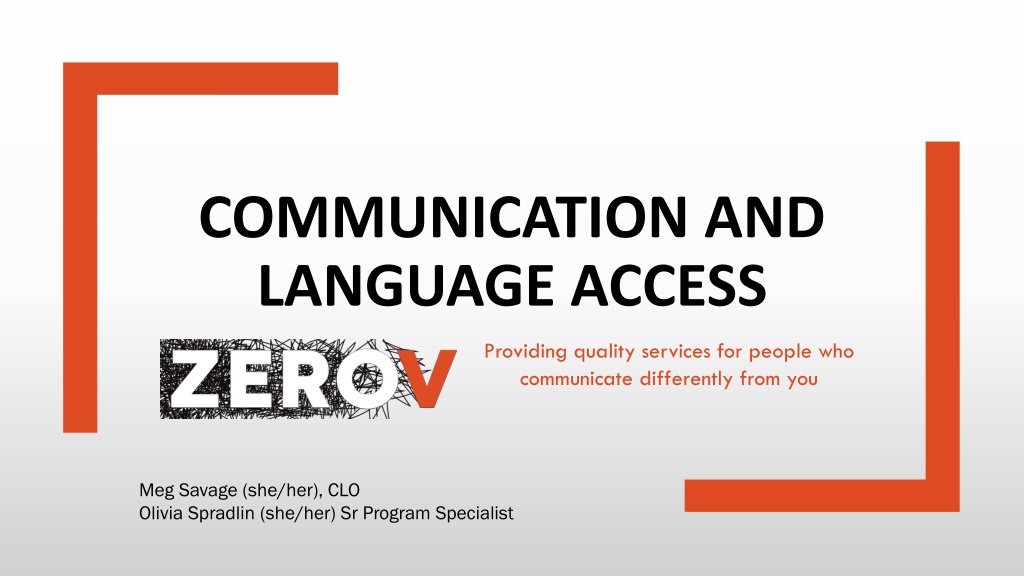
 undefined
undefined




